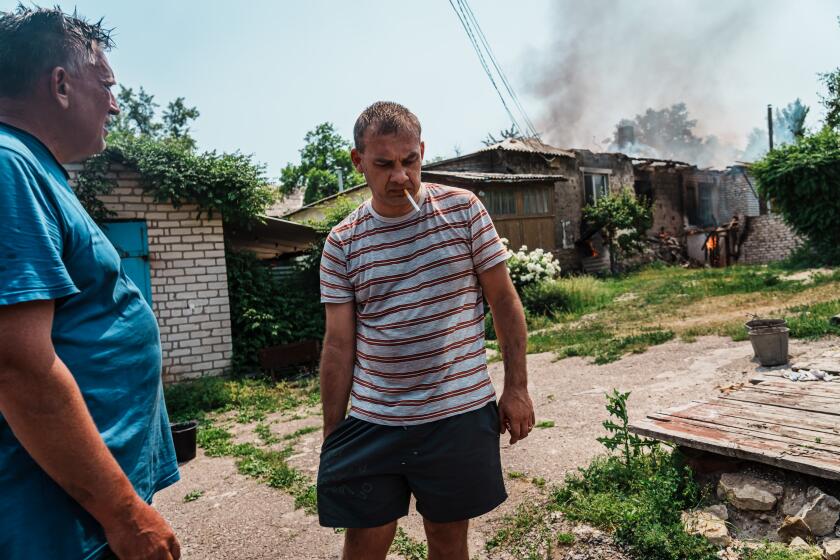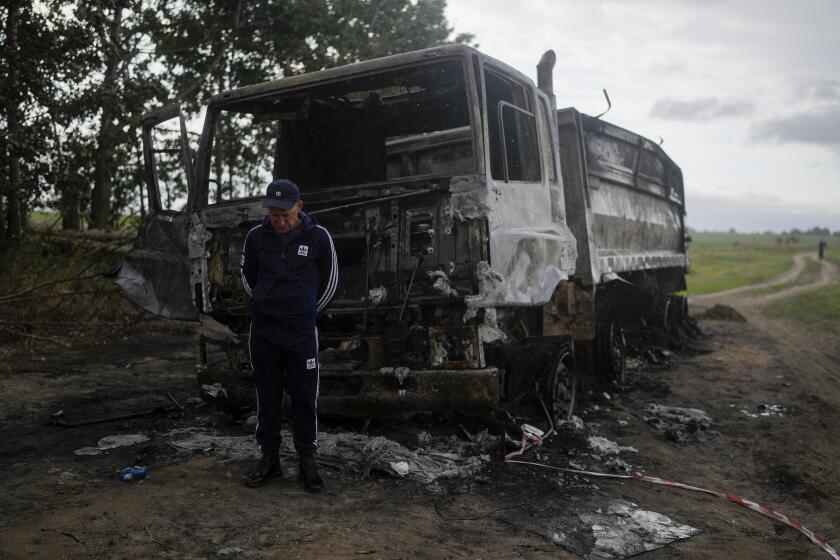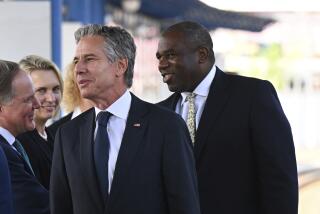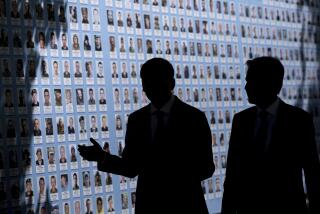Top European leaders visit Kyiv amid fierce Russian attacks in the Donbas
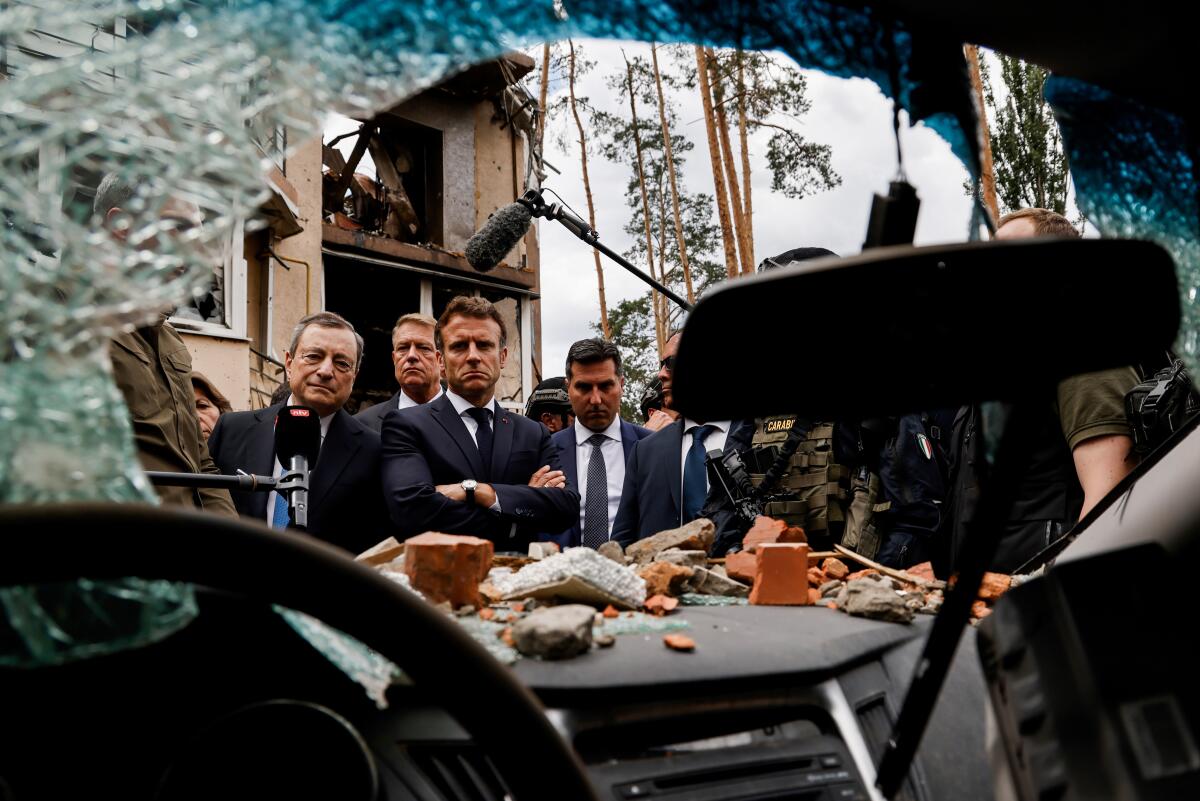
- Share via
TORETSK, Ukraine — The leaders of the European Union’s three most influential countries arrived in Ukraine on Thursday in one of the biggest displays of support for the beleaguered nation after four months of Russian assault.
The visit to Kyiv by French President Emmanuel Macron, German Chancellor Olaf Scholz and Italian Prime Minister Mario Draghi took place as criticism has grown of Europe’s strategy in supporting Ukraine and after repeated pleas from Ukrainian President Volodymyr Zelensky for the West to deliver more and stronger weapons to aid his fighters.
To blunt the criticism, the leaders quickly endorsed Ukraine’s candidacy to the European Union.
Macron, who joined Draghi and Scholz to cross Ukraine’s western border by train to arrive in Kyiv, said he was there to bring a “message of unity” and “to talk both about the present and the future, because we know the coming weeks are going to be very hard.”
Romanian President Klaus Iohannis arrived separately and joined the other three European leaders as they toured Irpin — a Kyiv suburb that was among the worst-hit in the early phase of the war and site of atrocities attributed to Russian forces — before the group met with Zelensky and posed for photos in front of the presidential palace in the capital.
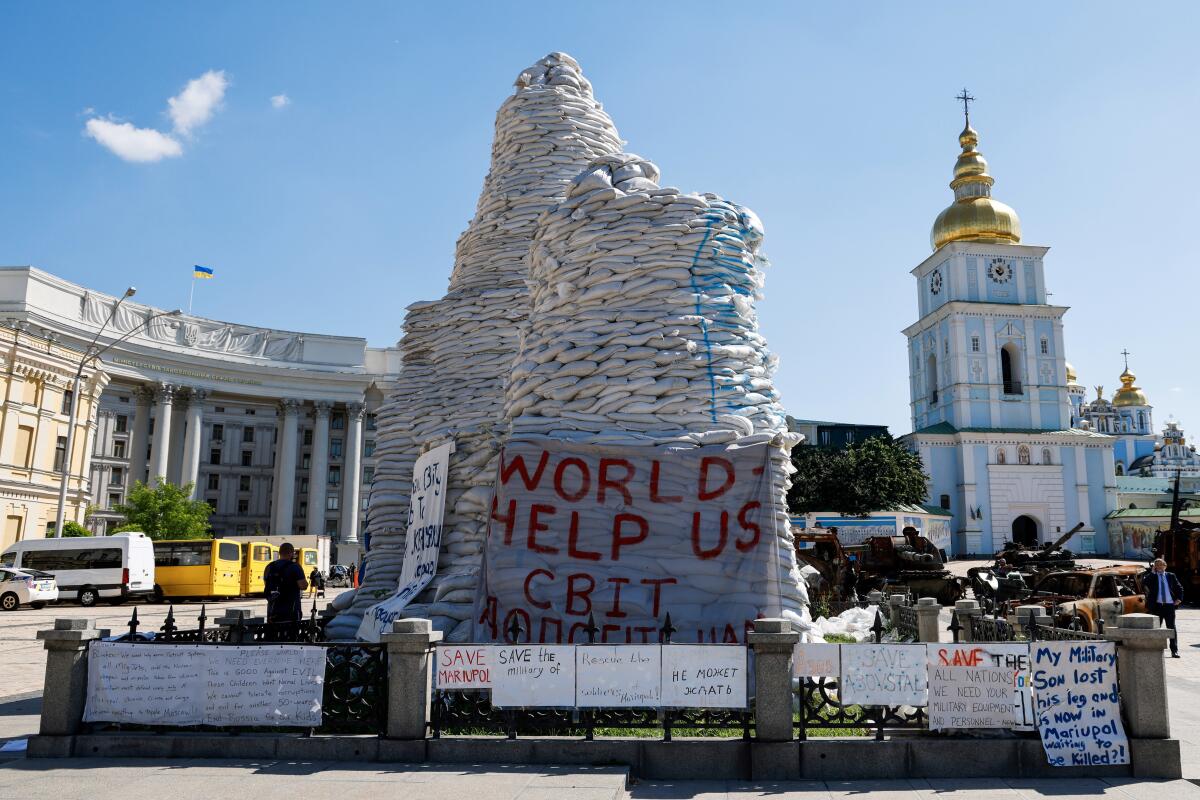
“It is an important moment,” Macron said of the diplomacy, which came as the war entered its 17th week. After the meetings concluded, Macron urged the Russian blockade of Ukrainian ports be lifted to allow the transport of Ukraine’s large — and languishing — grain exports and condemned brutal Russian actions that had killed civilians, demanding perpetrators of war crimes be brought to justice.
“As long as necessary, until peace returns to a free and independent Ukraine, we will remain committed” to military and economic support “to enable Ukrainian soldiers to make a difference on the ground against the Russian army’s attacks,” Macron said on Twitter.
Macron was also quoted as saying the countries supported Ukraine’s bid to join the EU. An EU body is expected to make a recommendation Friday that Ukraine should be considered for membership in the bloc, though admission would require the approval of all 27 EU states and usually follows a lengthy process.
Although foreign dignitaries have regularly traveled to Kyiv to express their backing of Zelensky, it was the first visit by the leaders of France and Germany, traditionally the EU’s two drivers, both of which have been accused by Ukraine of offering inadequate support.
Macron recently faced criticism after calling for Western leaders to avoid “humiliating” Russia. Scholz, whose nation is heavily reliant on Russian energy imports, has expressed doubts over a European Union ban on Moscow’s gas and oil industry, though he has softened his view over the months.
A sense of death hangs over cities in eastern Ukraine
In Moscow, former Russian President Dmitry Medvedev dismissed the visit to Kyiv by leaders he disdainfully described as “European connoisseurs of frogs, liverwurst and pasta.” Medvedev, who is deputy chairman of the Russian Security Council, said on Twitter that the benefits of the meeting were “nil” and that it would “not bring Ukraine closer to peace.”
During a phone call with journalists, Kremlin spokesman Dmitry Peskov also downplayed the gathering.
“I would hope that the leaders ... will not focus only on supporting Ukraine by further pumping it with weapons,” Peskov said. “That’s absolutely pointless — it will prolong people’s suffering and cause new damage to the country.”
Russian forces are laying mines and other explosives that disrupt agriculture and rebuilding and leave the risk of death even after the fighting stops.
The EU leaders’ pilgrimage to Kyiv, which has remained relatively unscathed by the war in the last few weeks, came against the backdrop of an all-out Russian assault in the eastern Donbas region. The area, which borders Russia, has been the focus of Moscow’s ambitions since the late spring after its troops were beaten back from Kyiv and Kharkiv, Ukraine’s second-largest city.
At the same time, the Kremlin has taken control of key cities, including the southern port city of Mariupol as well as Kherson, the first urban area to fall to invading forces early in the war.
In the Donbas, Ukraine’s industrial heartland, no city remains unaffected by the war.
A weekday in Toretsk, a small city in Donetsk province, would normally see many of its 31,000 residents going to work at two government-owned mines. But like many other areas in the Donbas, Toretsk seemed empty Thursday, with mostly uniformed service personnel and the occasional group of residents lining up at ATMs and outside shops.

Russian forces bombard the southern bridge connecting Lysychansk to Severodonetsk, rendering it unusable for 12,000 residents and hundreds of Ukrainian defenders.
In the morning, what appeared to be a missile struck one of the mines on the edge of town. Some people nearby seemed unconcerned, going about their business with barely a glance at the smoke wreathing the mine’s tower.
Moscow’s troops also have waged an aggressive battle for the city of Severodonetsk, with Ukrainian officials all but saying they expect the area to fall to Russia.
The regional governor of Luhansk province, Serhiy Haidai, said this week that Moscow controlled 80% of Severodonetsk, which lies on the strategic Seversky Donets River and is one of the last places in Luhansk still in Ukrainian hands. Evacuations, he said, are “simply not possible.”
Breaking News
Get breaking news, investigations, analysis and more signature journalism from the Los Angeles Times in your inbox.
You may occasionally receive promotional content from the Los Angeles Times.
On Thursday, Haidai said the shelling of Severodonetsk had grown to a point that “people can no longer stand it in the shelters” and that their “psychological state is on the edge.”
Haidai said residents were low on clean water and food. He described a “catastrophic” scene for residents, many of whom now live amid rubble and burned-out buildings.
The strife in the Donbas has continued even as nations have increased sanctions on Russia and offered additional aid to Ukraine, which has received billions of dollars from European nations, the U.S. and others.
After speaking to Zelensky on Wednesday, President Biden said the U.S. would give an additional $1 billion in defense aid, including anti-ship systems, artillery, rockets and rounds for howitzers.
Biden is expected to attend a North Atlantic Treaty Organization summit in Brussels at the end of the month, at which the alliance is expected to come up with new aid for Kyiv.
“NATO allies are prepared to continue to provide substantial, unprecedented support to Ukraine,” NATO Secretary General Jens Stoltenberg said Thursday at a meeting of defense ministers to prepare for the summit. The support will include heavy weapons and long-range systems, he said.
U.S. Defense Secretary Lloyd J. Austin III also attended the meeting. “We’re going to continue to move heaven and earth to get them the capability that they need,” he said.
Recent insistent reports from the Donbas region have suggested Ukrainian fighters are low on ammunition and losing ground against relentless Russia bombardment.
On Thursday, Britain announced a new round of sanctions on Russian entities, including against Patriarch Kirill of the Russian Orthodox Church. In a statement, British Foreign Secretary Liz Truss said Kirill, a Putin ally, has “repeatedly abused his position to justify the war” on Ukraine.
Also Thursday, the U.S. State Department said it is investigating what it called unconfirmed reports of the capture by Russia of two U.S. citizens fighting in Ukraine.
“We are in contact with Ukrainian authorities as well as the International Committee of the Red Cross and the families of the two reported missing U.S. citizens,” spokesman Ned Price said.
U.S. officials have not yet contacted Russia, he added, because they have not been able to independently verify the capture. He said the department is also looking into reports of a third missing U.S. citizen and again urged Americans find ways to support Ukraine without joining combat.
Bulos reported from Toretsk, Kaleem from London and Wilkinson from Washington.
More to Read
Sign up for Essential California
The most important California stories and recommendations in your inbox every morning.
You may occasionally receive promotional content from the Los Angeles Times.
